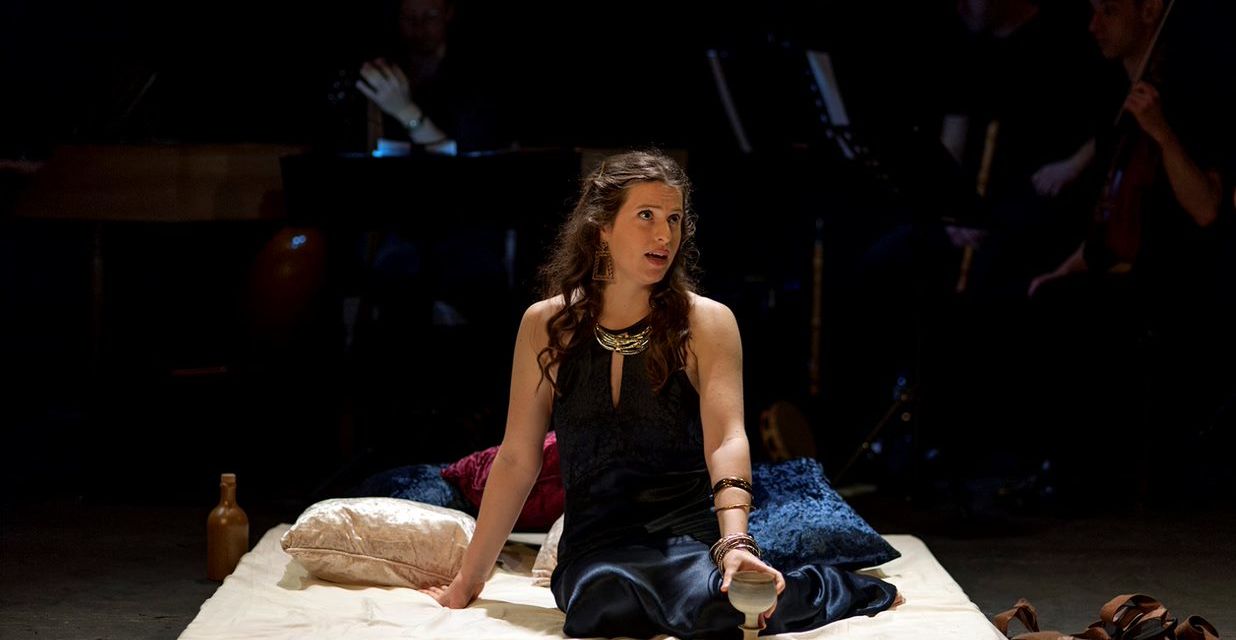Venus / Dido, HGO’s latest production is a double-bill of two short English Baroque masterpieces: John Blow’s Venus and Adonis and Henry Purcell’s Dido and Aeneas.
Although there is some debate as to exactly when they were composed, both pieces date from the 1680s. The structure and overall effect of both, along with their themes of love, death and abandonment, are very similar, making them an excellent pairing.
The evening begins with Venus. The Prologue opens with Cupid as the manager of a successful dating app, Celestial Powers. It’s a good name – I’m surprised no one has actually used it. British countertenor Ralph Thomas Williams is in fine form as a rather camp Cupid; his voice is beautiful.
Venus herself gets sucked into using the app – the modern equivalent of being pierced by Cupid’s arrow – and falls head over heels for Adonis. The present day is then left behind as we head into a mythical past where the two lovers sing of their devotion to each other.
A hunt approaches and Venus encourages Adonis to join it; he tries to refuse but eventually gives in, being drawn away by a chorus of huntsmen. Venus is now joined by Cupid and a chorus of cherubs as she schools them in how to punish faithless lovers; at the same time Adonis is fatally wounded by the stag he is hunting.
In the final Act he is taken to Venus and the pair are left alone. Singing once again of their love and the cruel fate of being torn apart, Adonis dies and Venus is distraught.
HGO exists to promote young singers and many of the main roles are shared. On the evening I went, Venus was sung by Welsh soprano Issy Bridgeman. She is playful and light hearted until the final Act, when her despair is evident. Her voice is excellent – rich, expressive and velvety.
After the 20-minute interval we get to the second half of that Venus / Dido divide. Our queen here is head of an unnamed company. She despairs that she knows no peace, but her closest advisor, Belinda, believes the source of her trouble is her love for the visiting Aeneas.
She assures Dido that the young hero loves her and that they will be together. The queen is unsure but is eventually convinced – especially when Aeneas himself declares his own feelings and claims he will stay with her forever.
German soprano Anna-Luise Wagner is excellent as Belinda. She’s like the annoying, perky HR officer who’s always organising ‘fun’ work events; she probably has a little plaque that reads ‘You don’t have to be mad to work here, but it helps’ pinned up above her desk. This makes it all the more tragic when her optimism results in tragedy.
Working against Belinda are the Sorceress and her coterie of witches, here transformed into disgruntled cleaners who have had enough of their poor treatment at Dido’s hands. They hatch a plan to convince Aeneas to leave.
Catalan mezzo-soprano Mercè Bruguera Abelló as the Sorceress and British soprano Olivia Carrell and British mezzo-soprano Abbie Ward as the two witches/cleaners are witty and spiteful, seeming to have real fun with the roles.
The plan works and Aeneas agrees to leave, abandoning Dido, who is devastated by his fecklessness. When he tries to change his mind and stay, she rejects him, sending him away and taking her own life.
At this point I have to mention the music. This is provided by HGOAntiqua Orchestra, a Baroque ensemble of strings, theorbo, Baroque guitar, oboe and recorder; it’s led by music director Seb Gillot, who also plays the harpsichord. The playing is excellent; the music beautiful.
Directed by Jessica Dalton, with stage management by Zoe Chan, the production makes good use of the theatre’s small space.
It was a thoroughly enjoyable evening that showcased some wonderful up-and-coming talent. Venus / Dido is playing at the Cockpit Theatre, in north-west London, until 29 May; tickets cost £32 and are available from the theatre.
Image
Welsh soprano Issy Bridgeman as Venus in HGO’s double-bill production Venus / Dido (Laurent Compagnon).

